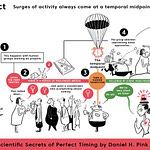I want to share a few totally unrelated pieces of thinking that caught my eye. This will be a shorty but I think you’ll find it interesting.
1
I am taken with this concept of exnovation, which is the counterbalance of innovation. To constantly make something new, you have to dismantle the old; to organize your team around iterating and innovating you need to systematize the dismantling. This is from a post on Medium by the Politics for Tomorrow, who - in the same spirit of championing failure with slogans like “fail cheaply” or “move fast and break things” - demonstrate the necessity of embracing the phasing-out of stuff by showing it as part of a larger system of innovation.

They discovered that stabilizing the new is not enough to achieve systemic change. In order to embed innovation in an existing “regime” or status quo, non-sustainable technologies and the related systems, infrastructures and livelihoods around these technologies had to be phased out in a deliberate and socially responsible way.
Super cool.
2
Subject matter expertise in product design is over-valued. In his advice in hiring a head of product, Rich Mironov describes some of the biases subject-matter experts have in design decision making - usually having to do with lack of respect for the need for constant discovery. “I know about advertising, so I know ….” etc.
This should probably resonate with you all who value the process and rituals of user experience design, where good design is the result of disciplined practice. This then emphasizes the value of solid practitioners, an de-emphasizes the value of experts.
3
Perhaps the best way to sum-up my gripes with personas is that personas are easier to get wrong than right, and wrong personas are more likely to inspire resistance rather than empathy. This insight originated with a post from Christin Roman. In their conclusion they suggest alternatives - but honestly in my conclusion the value of any kind of user archetype is a red herring.
4
The near future of remote work is going to be very, very messy. It starts with the illusion that a remote worker moving somewhere with a cheaper cost of living will get to keep their salary, and then it will be encumbered by a struggle for privacy. I mostly just want to share this snippet from an article by the Economist (paywall):
Already the gig economy has shown that it is out of date. Now new prickly questions about workers’ rights and responsibilities loom: can firms monitor remote workers to assess their productivity? Who is liable if employees injure themselves at home? Any sense that white-collar workers are getting perks will create simmering resentment in the rest of the workforce.
5
What underlies patterns in user behavior? Structure. Specific touchpoints in an existing process, organizational pressures, policies and rules of thumb, or even rituals. I don’t know how best to credit this post without an author, but the folks at Eco Challenge (?) added levels of thinking to the familiar Iceberg model. This is interesting to me because I suppose I never really said aloud what this makes obvious: patterns are supported by the things we, or our predecessors, made. That means we can improve or unmake them. This is a powerful observation.

End
Consider liking (❤) this issue of Metric if this made you think.
Metric is a podcast, too. Subscribe to Metric on Apple Podcasts, Google Play, Spotify, Stitcher, and all the usual places.
I write about design and philosophy in another newsletter called Stoic Designer. Read “Letter 76: Shirking Routine,” then subscribe.











Share this post